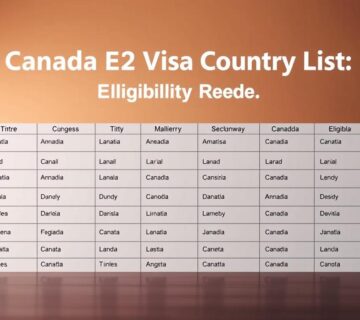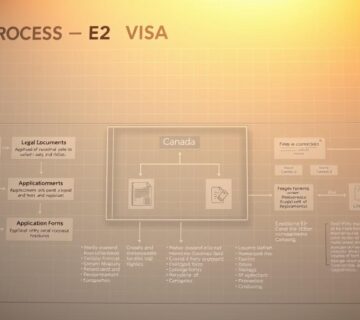Did you know that over 200,000 E-2 visas are issued annually to investors and their families? This popular nonimmigrant visa offers a pathway for foreign nationals from treaty countries to direct and develop a business in the United States. The E-2 visa is particularly appealing because it allows for indefinite renewal, provided the business remains operational and meets the visa requirements.
The E-2 visa enables treaty investors to enter and work in the U.S. by investing a substantial amount of capital in a bona fide enterprise. While there’s no fixed minimum investment amount, investments typically range between $100,000 to $250,000, depending on the nature of the business. The enterprise must also demonstrate the capacity to generate income beyond what is necessary for minimal living expenses, ensuring it is not a marginal business.
Raman Sohi of Sohi Law Group emphasizes that understanding the eligibility criteria and application process is crucial for a successful E-2 visa petition. The process involves submitting detailed documentation, including proof of investment, business plans, and evidence of the enterprise’s operational viability. Spouses of E-2 visa holders are also eligible for employment authorization, making this visa a practical option for families.
For those navigating the complexities of the E-2 visa, expert guidance is essential. Raman Sohi and the Sohi Law Group provide comprehensive legal support, ensuring applicants meet all requirements and avoid common pitfalls. With their expertise, investors can confidently pursue their business goals in the United States. For more information or to schedule a consultation, call 833-877-9797.
Introduction to E2 Visa USA Requirements
Foreign nationals from treaty countries can explore business opportunities in the United States through the E-2 visa. This nonimmigrant visa is designed for treaty investors who wish to direct and develop a U.S. enterprise. The E-2 visa offers several benefits, including indefinite renewal as long as the business remains operational and meets the necessary requirements.
Overview of the E-2 Visa
The E-2 visa allows investors to manage a business in the U.S. by investing a substantial amount of capital. While there’s no fixed minimum investment, typical investments range from $100,000 to $250,000. The enterprise must also demonstrate the potential to generate significant income, beyond what is needed for basic living expenses, ensuring it’s not a marginal business.
Benefits for Investors and Entrepreneurs
One of the key advantages of the E-2 visa is its flexibility. Investors can operate a wide range of businesses, from small startups to larger enterprises. Additionally, spouses of E-2 visa holders are eligible for employment authorization, making this visa a practical option for families. The visa also allows for travel in and out of the U.S. as long as it remains valid.
Understanding the eligibility criteria and application process is crucial for a successful E-2 visa petition. The process involves submitting detailed documentation, including proof of investment, business plans, and evidence of the enterprise’s operational viability. For more information on the E-2 visa and how to navigate the application process, visit Sohi Law Group.
Deep Dive into e2 visa usa requirements
Understanding the intricacies of the E2 visa requirements is essential for a smooth application process. This section delves into the critical aspects of treaty countries and the investment criteria, providing clarity for investors seeking to establish a business in the United States.
Treaty Country and Investment Criteria
A treaty country is one that has a formal agreement with the United States, allowing its nationals to apply for an E2 visa. To qualify, investors must be nationals from such countries and own at least 50% of the U.S. enterprise they intend to direct and develop.
The investment must be substantial, meaning it should be significant relative to the business’s value. For instance, a $50,000 investment might be sufficient for a small startup, while a larger enterprise could require $200,000 or more. The funds must also be at risk, meaning they are subject to partial or total loss if the business fails.
Documenting a Substantial Capital Investment
Applicants must provide thorough documentation to prove their investment. This includes bank statements, tax returns, and a detailed business plan outlining how funds will be used and the potential for income generation. The enterprise must demonstrate the capacity to generate significant income, beyond what is necessary for minimal living expenses, ensuring it is not a marginal business.
| Criteria | Details | Examples |
|---|---|---|
| Treaty Country | Must have an E2 treaty with the U.S. | Canada, Mexico, Japan, etc. |
| Substantial Investment | Investment amount relative to business value | $100,000 for a $500,000 business |
| Active Investment | Funds must be irrevocably committed | Transferred to a U.S. business account |
| Risk of Loss | Funds subject to potential loss | Invested in operational activities |
| Non-Marginal Business | Generates significant income | Supports investor and creates jobs |
By understanding and meeting these criteria, investors can navigate the E2 visa process more effectively, ensuring their application is robust and complete.
Eligibility Criteria for Treaty Investors
To qualify for a treaty investor visa, applicants must meet two primary criteria: nationality and capital investment. These requirements ensure that the visa is granted to legitimate investors who can contribute to the U.S. economy.
Nationality and Capital Investment Requirements
The first step in determining eligibility is verifying the applicant’s nationality. They must be a national of a country that has a treaty of commerce and navigation with the United States. This treaty country status is essential, as it forms the foundation of the visa’s eligibility.
The second critical requirement is a substantial capital investment. The U.S. Department of State defines this as an investment that is significant relative to the business’s value. For example, a smaller business might require a $50,000 investment, while a larger enterprise could need $200,000 or more. The funds must be irrevocably committed, meaning they are at risk of loss, and the investment must be in an active business, not a passive one like real estate.
| Criteria | Details | Examples |
|---|---|---|
| Treaty Country | Must have a treaty with the U.S. | Canada, Mexico, Japan |
| Substantial Investment | Investment relative to business value | $100,000 for a $500,000 business |
| Active Investment | Funds must be irrevocably committed | Transferred to a U.S. business account |
| Risk of Loss | Funds subject to potential loss | Invested in operational activities |
| Non-Marginal Business | Generates significant income | Supports investor and creates jobs |
Failing to meet either the nationality or investment requirement can result in the denial of the visa. Therefore, it is crucial to provide thorough documentation, including proof of investment, business plans, and financial statements, to demonstrate eligibility.
For more detailed guidance on navigating the E-2 visa process, visit the Sohi Law Group. Their expertise can help ensure your application is robust and complete.

How to Apply: Step-by-Step Process
Applying for a treaty investor visa involves a structured process that ensures all legal and documentation requirements are met. This section outlines the steps to help you navigate the application process smoothly.
Preparing Your Application Documents
The first step is to gather all necessary documents. This includes proof of investment, a detailed business plan, and evidence of your enterprise’s operational viability. Ensure your investment is substantial and at risk, demonstrating its commitment to the business.
Filing the Correct Forms and Submissions
Submit Form I-129 for nonimmigrant workers. If applying from outside the U.S., complete Form DS-160. Ensure all documentation is accurate and compliant with U.S. legal standards. The application fee is $315, with possible additional fees depending on your country.
| Step | Description | Example |
|---|---|---|
| 1. Prepare Documents | Gather proof of investment and business plans. | Bank statements, tax returns, business plan. |
| 2. File Forms | Submit Form I-129 or DS-160. | Complete forms accurately and submit. |
| 3. Pay Fees | Cover application and potential additional fees. | $315 base fee. |
| 4. Verify Details | Ensure all information is accurate. | Double-check all documents. |

For guidance on avoiding common pitfalls, visit Sohi Law Group. Their expertise can help ensure your application is robust and complete.
Navigating the Visa Interview Process
Preparing for a visa interview can be a daunting task, but with the right approach, you can feel confident and well-prepared. The interview is a crucial step in the process, allowing consular officers to assess your eligibility and the legitimacy of your application.
Practical Tips for Interview Preparation
To ensure a smooth experience, start by organizing your documents. Bring a complete set of paperwork, including your DS-160 confirmation, appointment letter, passport, and financial documents. Being organized shows professionalism and respect for the process.
Next, anticipate common questions. Consular officers often ask about your business plan, investment amount, and how your enterprise will benefit the U.S. economy. Practice answering these questions clearly and honestly. Consider conducting mock interviews with a friend or legal advisor to build confidence.
Remember, honesty and consistency are key. Avoid exaggerations and ensure your answers align with the information in your application. If you’re unsure about a question, it’s better to admit it than provide incorrect information.
Special considerations apply if you’re bringing dependents. Ensure all family members understand the process and have their documents ready. A well-prepared interview significantly enhances your chances of a successful outcome.

By following these tips, you can approach your visa interview with confidence. Remember, preparation is your best ally in this process.
Business Investment and Enterprise Guidelines
For investors seeking to establish a business in the United States, understanding the guidelines for a bona fide enterprise is crucial. This section explores the definition of such an enterprise and its importance in the E-2 visa process.
Defining a Bona Fide Enterprise
A bona fide enterprise is a real, active business that produces goods or services for profit and meets legal business standards. It must demonstrate economic viability and operational activity, ensuring it is not a marginal business.
- A bona fide enterprise must be engaged in producing goods or services for profit.
- It should demonstrate real business activity and economic viability.
- The enterprise must generate income above minimal living standards for the investor and family.
- Legal requirements for business operation in the United States include applicable permits and licenses.
The enterprise must be a real and active commercial or entrepreneurial undertaking, producing goods or services for profit. Idle speculative investments, such as undeveloped land or stocks without active management, do not qualify. Non-profit organizations are also ineligible as the investment must aim to generate profit and sustain itself.
A comprehensive business plan is essential for new U.S. companies applying for the E-2 visa, detailing operational timelines, projected income, staffing, and market analysis. The business plan should include financial projections for the next five years, providing a clear roadmap for the enterprise’s growth and profitability.
For more detailed guidance on the E-2 visa process, visit the official government resource. This will help ensure your application is robust and complete.

Understanding Terms, Conditions, and Extensions
Managing an E-2 visa involves understanding its terms and conditions to maintain legal status. The visa is granted for an initial period of two years, which can be extended indefinitely in two-year increments. This flexibility allows investors to continue operating their businesses in the United States as long as the enterprise remains viable and meets all visa requirements.
Duration of Stay and Extensions
The E-2 visa is initially valid for two years, but it can be extended as long as the business remains operational and the investor maintains their intent to depart upon visa expiration. Extensions are typically granted in two-year increments, provided the investor continues to meet all eligibility criteria. It’s crucial to apply for extensions before the current visa expires to avoid falling out of status.
Any substantive changes to the business, such as a significant shift in operations or ownership, may require re-application or additional filings. Investors must notify the appropriate authorities of any material changes to ensure compliance with visa regulations.
Change of Status Considerations
Changing status while on an E-2 visa involves filing the appropriate forms and following specific procedures. For example, if an investor wishes to change their status to another visa category, they must submit the necessary paperwork and meet the eligibility requirements for the new status. This process can be complex, so seeking legal advice is highly recommended.
Regulatory guidelines govern the extension and change of status procedures, ensuring that all applicants meet the necessary criteria. Timely applications are essential to avoid complications and maintain legal status in the United States.
For more detailed information on E-2 visa extensions and change of status procedures, visit the Sohi Law Group. Their expertise can provide guidance tailored to your specific situation.

Family and Dependent Considerations
When applying for an E-2 visa, it’s important to consider the implications for your family. Dependents, including spouses and children, can accompany you to the United States, but there are specific guidelines to follow.
Eligibility of Spouses and Children
Spouses and unmarried children under the age of 21 are eligible to join E-2 visa holders in the U.S. Dependents must demonstrate financial dependence on the primary applicant and provide proof of relationship. Children must provide a birth certificate, and passports must have at least 24 to 30 months of validity remaining.
Employment Authorization for Dependents
E-2 visa holders’ spouses can legally work in the U.S. without needing an Employment Authorization Document (EAD). However, dependent children are not permitted to work while in the U.S. on this visa. Spouses must contribute to Social Security and Medicare, which may provide long-term benefits.
| Category | Details |
|---|---|
| Spouses | Eligible for employment authorization without an EAD; must demonstrate financial dependence. |
| Children | Unmarried children under 21 can accompany the primary applicant; no work authorization. |
| Documentation | Proof of marriage for spouses; birth certificate for children. |

Dependents’ stay aligns with the primary applicant’s visa period. Children “age out” at 21 and must seek alternative visa options. The E-2 visa offers legal protections for family members, enhancing their experience in the U.S.
Expert Guidance from Sohi Law Group
Navigating the complexities of U.S. immigration law requires more than just knowledge—it demands expertise and a personalized approach. Raman Sohi and the Sohi Law Group specialize in providing tailored legal solutions for investors and entrepreneurs seeking to establish a business in the United States.
Connect with Raman Sohi for Personalized Advice
Raman Sohi, a seasoned attorney with extensive experience in immigration law, leads the Sohi Law Group in offering comprehensive legal support. Their team understands the intricacies of the E-2 visa process, ensuring that each client receives step-by-step guidance tailored to their unique situation.
- The firm provides clear, personalized advice to help clients navigate the visa application process seamlessly.
- Client testimonials highlight the firm’s deep understanding of E-2 visa procedures and their success in securing approvals.
Prospective clients can contact the Sohi Law Group directly at 833-877-9797 for an in-depth consultation. Their expertise is invaluable in navigating the complex U.S. immigration system, significantly improving the chances of a successful visa application.

Conclusion
In conclusion, the E-2 visa offers a compelling opportunity for foreign nationals from treaty countries to establish and manage a business in the United States. To ensure a successful application, it is crucial to thoroughly understand the eligibility criteria, including nationality requirements and the need for a substantial investment in a bona fide enterprise.
The application process demands meticulous preparation, with detailed documentation such as proof of investment, a comprehensive business plan, and evidence of the enterprise’s operational viability. A well-organized approach not only streamlines the process but also enhances the likelihood of approval.
Given the complexities of U.S. immigration law, seeking expert legal guidance is highly recommended. Raman Sohi and the Sohi Law Group offer specialized knowledge and personalized support, helping applicants navigate the intricacies of the E-2 visa process with confidence.
If you are considering applying for an E-2 visa or need assistance with any aspect of your application, contact the Sohi Law Group today at 833-877-9797. Their expertise ensures that your application is robust, complete, and positioned for success.





No comment